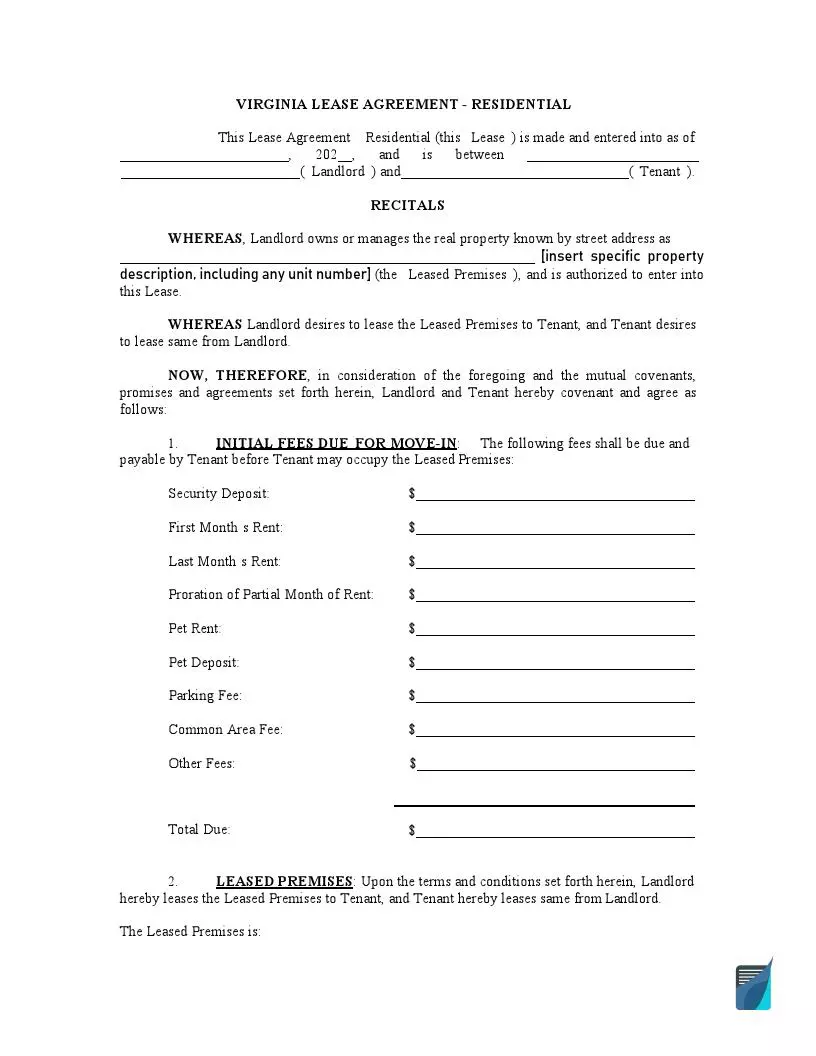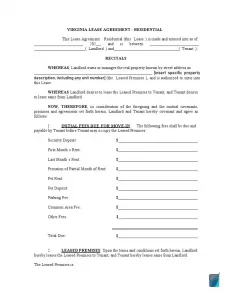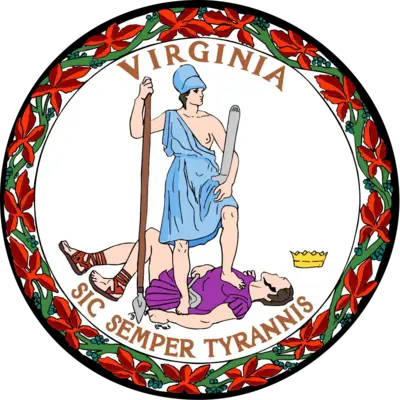Virginia Rental Lease Agreement Forms
If an individual or a company decides to rent space to someone else, some documents usually follow the deal. A rental agreement (or a lease agreement) is an essential document with a template similar to a contract, which both parties have to sign to protect themselves.
The party that has the real property item and passes it to someone is referred to as the landlord or the owner. The other party that obtains that premises is the tenant or the renter.
A rental agreement is a fundamental legal form when a rental deal occurs. It reveals essential aspects of the agreement like the price of the lease, conditions of the rented property, rules for a tenant, period of rent, personal details of an owner and a tenant, and so on.
To successfully create a lease agreement in Virginia, you need to download the correct template first. To speed the completion up, you may use our form building software.

Build Your Document
Answer a few simple questions to make your document in minutes
Save and Print
Save progress and finish on any device, download and print anytime
Sign and Use
Your valid, lawyer-approved document is ready
Virginia Laws and Lease Requirements
Lease agreements and rules for completing them differ in every US state. In Virginia, laws that regulate this topic are incorporated in the Residential Landlord and Tenant Act that starts with section 55.1-1200 of the Code of Virginia.
Security Deposits in Virginia
In Virginia, the owner has to give the security deposit back to the renter within 45 days of cancelation or the end of the rental agreement.
The maximum amount of the security deposit cannot exceed an equivalent of two month’s rent.
Both of these rules are stated in section 55.1-1226 of the Code of Virginia.
Owner’s Access
In Virginia, the owner has to give a 24-hour notice to the tenant before visiting the premises.
If an emergency case takes place, the landlord may access the premises without any limits or notifications.
These statements are described in Section 55.1-1229 of the Code of Virginia.
Needed Disclosures
A rental agreement in the United States is normally supplemented by several disclosures that both parties have to accept before signing the agreement itself. The list of disclosures that is needed in Virginia includes:
- Methamphetamines disclosure.
In case the previous tenants had produced methamphetamines in the rented space and did not clean it properly after the production process, the renter should be aware of this fact.
- Notices disclosure.
Because parties may exchange notifications via email, both the owner and the renter have to disclose their valid email addresses.
- Lead-based paint disclosure.
If the leased property was constructed before 1978, the landlord is obliged to provide this disclosure to warn a tenant that there might be dangerous traces of lead in the premises’ paint.
- Move-in checklist.
Within the first five days of a renter’s stay in the space, both the renter and the owner should exchange a checklist that describes things for possible improvement in the property. Also, a full list of the items in the leased space is included in this checklist.
- Defective drywall disclosure.
The presence of defective drywall in the rented space should be revealed to the renter (if applicable).
- Mold disclosure.
If there is mold in the rented premises, the owner has to notify the renter. If the renter finds the mold, they have five days from moving into the property to react.
- Utility ratio disclosure.
The owner has to describe to the tenant how they calculate the utility bills.
- Military (air) zone disclosure.
A tenant should know if the property is located close to any airbase or similar noise source.
- Planned demolition disclosure.
The renter should be aware of any plans related to the property demolition (or such possibility).
Common Types of Rental Agreements in Virginia
There are several types of lease agreements in Virginia as well as in other states. They are used for different deals. For instance, when you rent a house, one form is needed, and when you rent a commercial building to develop an office, another form should be used.
The most common lease agreements in Virginia include the Association of Realtor’s agreement, room lease agreement, standard residential rental agreement, commercial rental agreement, and other forms that let people conduct various deals.
When you decide to rent space, it does not matter if you are a tenant or a landlord. Make sure that you have chosen the correct template of a lease agreement that suits the deal.
Virginia Rental Lease Agreement Form Details
| Document Name | Virginia Rental Lease Agreement Form |
| Other Names | VA Rental Lease, Virginia Residential Lease Agreement |
| Relevant Laws | Virginia Residential Landlord and Tenant Act |
| Security Deposit Amount | Two months’ rent |
| Security Deposit Return | Forty-five (45) days from termination date |
| Avg. Time to Fill Out | 18 minutes |
| # of Fillable Fields | 119 |
| Available Formats | Adobe PDF |


We offer a range of popular Virginia forms to anyone looking for ease when handling various paperwork in the state.
Other Rental Lease Agreement Forms by State
